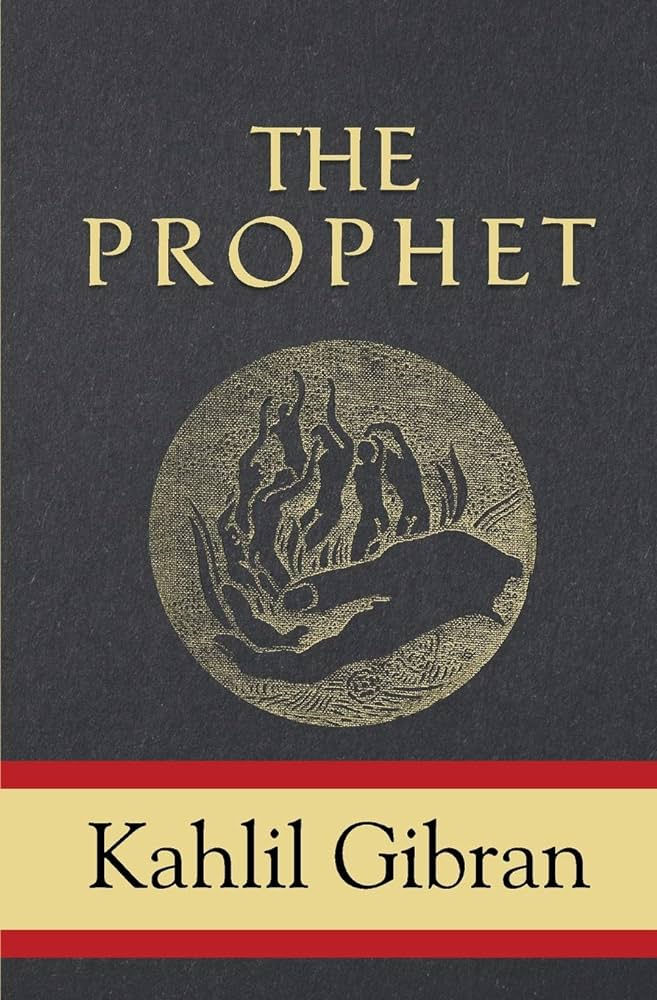"Yet the timeless in you is aware of life's timelessness, And knows that yesterday is but today's memory and tomorrow is today's dream."
~Kahlil Gibran
Author: Kahlil Gibran
Genre: Poetry, Fiction, Prose poetry
Originally Published: 1923

Kahlil Gibran’s masterpiece, The Prophet, is one of the most beloved classics of our time and one of the all-time best selling books.
The Prophet is a collection of poetic essays that are philosophical, spiritual, and, above all, inspirational. Gibran’s musings are divided into twenty-eight chapters covering such sprawling topics as love, marriage, children, giving, eating and drinking, work, joy and sorrow, housing, clothes, buying and selling, crime and punishment, laws, freedom, reason and passion, pain, self-knowledge, teaching, friendship, talking, time, good and evil, prayer, pleasure, beauty, religion, and death.
If Love exists as the highest ideal in this world, then The Prophet is the quintessential aphorism for that loftiest of ideals. There are certain times in your life, if you are lucky, to be completely blown away by a book. My first reading of Gibran's masterpiece was one of those rare times. Picked up out of sheer curiosity from a local bookstore - any studentof poetry need not study long before coming across the name Kahlil Gibran - the profound ideas and verses expressed so elegantly in The Prophet have encircled my mind and ensnared my heart.
Certain stanzas stand so supreme in their profundity, that one would require an entire lifetime to understand them. Such is the quality of thought, eloquence of writing and poetic genius expressed by Gibran that countless musicians (from Elvis to Lennon), countless writers (Paulo Coelho to Rabindranath Tagore) have found inspiration from the poet's mind.
"When you love you should not say, "God is in my heart," but rather, "I am in the heart of God."
If ever I have imagined a writer to be close to the heart of God, Gibran, so far in my life, has made the greatest case. In The Prophet, a unifying theme is the equation of Love to God. In fact, at times these words can often be used interchangeably, and many of the prophets advises (poems) in the book find a way to lead to love, and ultimately, to God.
"Beauty is eternity gazing at itself in the mirror. But you are eternity and you are the mirror."
Another common theme in the book is the personification of mystical concepts, such as eternity, the divine, the Almighty... you get the idea. He brings the transcendent to be closely, almost unconsciously human, and in doing so, makes the human quality transcendent.
Of many a topic, Gibran gives profound advice, from love, marriage, work, even pain - basically the entirety of the human experience is captured in this work.Just as there is diversity of thought and feeling in every person that exists on this Earth, yet there is a commonality that runs through the soul of mankind, so too does this book bring the commonality to light, whilst sweeping away unnecessary differences under the rug of unimportance, and speaks in the most beautiful way to that which unites one man into all men and into God himself. The simple language of the Gods - the language of Love and Understanding.
Gibran understood that we had to undertake every action in Love, he understood that pain is unavoidable with love,
"When love beckons to you, follow him. Though his ways are hard and steep."
But he also understood the necessity for pain, that pain in its ultimate form is Love waiting to be born,
"Your Joy is your sorrow unmasked. The deeper that sorrow can curve into your being. The more joy you can contain."
So dear reader, I leave you with an assignment of sorts today - pick up The Prophet, and read not with half attention, as Gibran would say, but read with an open heart and an open soul, and through his words, you will find your own heart and your own soul speaking to you. Enjoy!
Thank you for sharing perspectives about The Prophet, Mr. Vagabond 🤗
Read Not With Half Attention is a famous Khalil Gibran poem advising readers to make good use of this valuable life gifted to them. This poem does this by suggesting non-value-added life activities to reduce (eventually eliminate), helping readers reflect and pursue that which is important to make themselves a full vibrant life :)